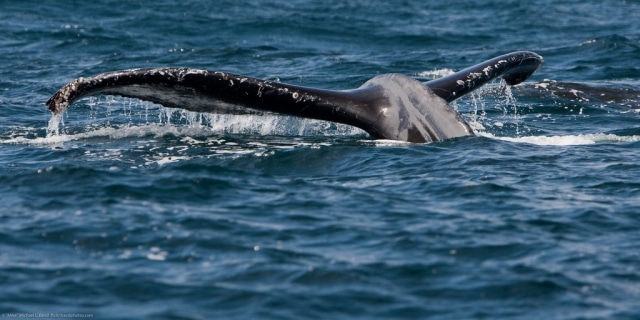This week the federal government was legally obligated to establish protected habitat for threatened North Pacific humpback whales. Instead the Harper government suddenly moved to take the humpback off the “threatened species” list. That would eliminate the legal requirement under Canada’s Species At Risk Act for protecting habitat along the British Columbia coast.
The government based the downgrade on a recommendation made by the Committee on the Status of Endangered Wildlife in Canada (COSEWIC), the independent scientific body that designates which wildlife species are in trouble, in 2011.
Critics have noted the decision eliminates a major obstacle to both the proposed Northern Gateway pipeline and the Kinder Morgan Trans Mountain pipeline expansion. After the conditional approval of the Northern Gateway pipeline by the National Energy Board’s joint review panel, the University of Victoria Environmental Law Centre launched a legal complaint on behalf of B.C. Nature requesting the government’s recovery strategy for humpback whales be taken into consideration.
A federal recovery strategy for humpback whales on the B.C. coast released in October cited potential increased oil tanker traffic as a danger to dwindling populations. The recovery strategy, released after a five-year delay, also noted the danger toxic spills posed to critical habitat.
If built, the two pipeline projects would increase oil tanker traffic from eight to 28 per month, increasing the risks of collisions with whales, potential spills in vital habitat and excessive noise.
The good news is that the North Pacific humpbacks are recovering after nearly being wiped out by whale hunting, Marty Leonard, chair of COSEWIC, told DeSmog Canada.
The whales were listed as a species of “special concern” back in 2011, Leonard said. “Their numbers are increasing which is good to see. But they still face threats.”
Those threats include oil spills, collisions with ships, entanglement in fishing gear and overfishing of their food sources.
The Pacific Ocean is the largest feature on the planet — bigger than all land areas combined. After 250 years of whaling, an estimated 1,400 humpbacks remained in the North Pacific. They’re among the largest marine mammals reaching 14 metres in length and weighing up to 40 tonnes. Hunting was banned in 1965 and today there are about 20,000 in the entire region. Perhaps 3,000 are found seasonally in B.C. waters.
The Species At Risk Act took affect in 2003, prior to which Canada had little endangered species protection.
In 2005, COSEWIC listed North Pacific humpbacks as a “threatened” species. COSEWIC defines “threatened” as a species likely to become endangered if nothing is done. “Endangered” means about to go extinct. The government’s move will demote the status of humpbacks to “species of special concern.”
The federal government is required to produce an official “recovery strategy” for all species on the endangered and threatened lists, including legal protection of essential habitat.
Despite its legal obligation, the Harper government has persistently failed to do so for humpbacks and another 170 species.
In September 2012, Ecojustice lawyers filed a lawsuit in response to the Harper government’s delay on behalf of five environmental groups, the David Suzuki Foundation, Greenpeace Canada, Sierra Club BC, Wilderness Committee and Wildsight.
In February 2014, the Federal Court ruled the Harper government was breaking the law and was very critical of the government’s delay.
“We took the federal government to court and won,” said Caitlyn Vernon of the Sierra Club BC.
“There is clearly an enormous systemic problem within the relevant Ministries,” Justice Anne L. Mactavish wrote in her judgment.
Justice Mactavish also noted that when it comes to protecting species, delay can lead to extinction.
The lawsuit prompted the Federal government to develop a recovery strategy for North Pacific humpbacks in September 2013, eight years after being listed as threatened.
The recovery strategy required legal protection of designated feeding grounds to be in place by this week, Vernon told DeSmog.
But rather than implement such protections, the government moved to downgrade the status of the whales to eliminate the need for legal protection of habitat.
“It’s good news humpback numbers are increasing, but their recovery is fragile. The science is clear that increased tanker traffic from the proposed pipelines will affect that recovery,” said Vernon.
“One oil spill and they’re back on the endangered species list.”
Subscribe to our newsletter
Stay up to date with DeSmog news and alerts







